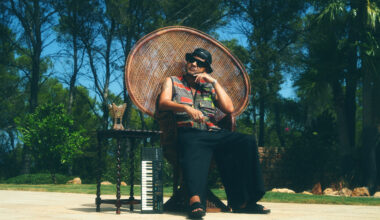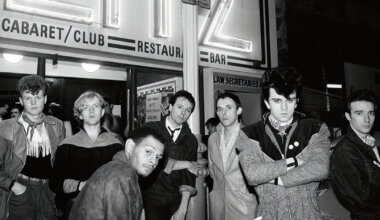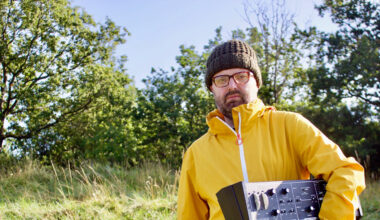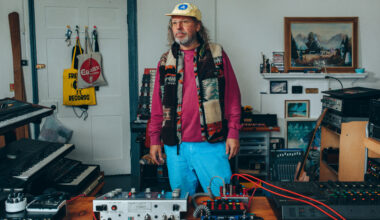Since reforming in 2010, The Pop Group have gone about reinventing themselves fit for a musical journey into the 21st century. We join Mark Stewart at the controls…
Mark Stewart, arch protagonist of The Pop Group, has a tea cup. The slogan on the side says, “Don’t be a pessimist: It wouldn’t work anyway”. For an agitated dissident singularly unable to turn away from the horrors of the world, 56-year-old Stewart is positively brimming with hope.
“Sometimes,” he says, “a dreamer’s dream can change the world. Hope is a power. All is not lost.”
The Pop Group are back. Not a pop group or even the The Pop Group who mainlined free-jazz and dub punk during the late 70s and early 80s. The Pop Group, consisting of Stewart, Gareth Sager (guitar), Bruce Smith (drums) and Dan Catsis (bass), has been technologically recalibrated.
“When we reformed in 2010 it was like a new project,” explains Stewart. “There was no way we wanted to try and make something that sounded like The Pop Group from back then. So I thought, ‘Why can’t I work with my old mates and see what happens?’ But it had to be something new. This album is the first time it’s really worked.”
It was The Simpsons creator Matt Groening who got the Bristolian post-punks back together after a 29-year hiatus in 2010 when he curated All Tomorrow’s Parties. It was a spark that brought the band back to life and, in 2015’s ‘Citizen Zombie’, saw their first new work in decades. ‘We Are Time’, a collection of early experiments was also released along with the re-issue of their second long-player, 1980’s ‘For How Much Longer Do We Tolerate Mass Murder?’. The Pop Group was a thing again.
“Help me please, I’m going on a desperate journey” is one of the opening lines from The Pop Group’s latest work, ‘Honeymoon On Mars’. You might be anticipating an album that confronts the rather strange times in which we live head on, after all this is a group that made its name while wrestling with the world’s ills. It’s a political album, yes, but for the next century. The calls-to-arms (‘Burn Your Flag’ and ‘War Inc’) are still there, but they’re rendered dream-like on a fictive journey that still manages to bury itself right beneath the skin. ‘Honeymoon On Mars’ is technologically abstract.
“They’re sci-fi lullabies,” says Stewart. “I had this vision of 10 years down the line, you wake up one morning and it’s like this planet is not your planet anymore. You feel so alienated and disconnected from everything that it feels like you’re on Mars. Psychopaths are running the world.”
Stewart says that this is the most cohesive album they’ve made.
“It’s sci-fi hip hop. For me, it’s the first piece that really kind of holds together. The album tells a story. ‘Days Like These’ is about claiming ownership of the future. We have to dream the future in order for it to happen and the help lies in technology.”
‘Honeymoon On Mars’ is technologically-driven both sonically and lyrically. Although Stewart has been outspoken on issues of globalisation and some of the threats that the digital world poses, he believes the answers reside within this realm.
“The World Wide Web was built by Tim Berners-Lee and he was a complete and utter idealist. Some of the most amazing brains today are in technology, out in the electronic frontiers. These people are dreaming our future.”
Stewart has spent decades travelling the world as a solo artist and collaborator under various guises, including Mouth 2, New Age Steppers and Mark Stewart & The Maffia. Ever since The Pop Group split in 1981, he has been merrily inventing genres and pocketing sounds. ‘Honeymoon On Mars’ is something of a culmination of his many sonic adventures.
“I wanted to draw on stuff that I’m into today,” he explains. “In the same way that we drew on funk and dub in the 70s, I wanted this album to be a crazy melange. I am mad about sub-bass at the moment, for example. I’m a magpie, I pick up shiny things to abuse, that’s the only way I can describe it. I was living in Berlin and some friends of mine were getting these cheap Korean video games machines and back-engineering them to get funny buzzes out of them. It’s these sorts of things that really interest me.”
Bristol is never far from the conversation. The Pop Group played Banksy’s dystopian bemusement park Dismaland in 2015, which in itself sounds like a scene from the cartoon show that indirectly resurrected The Pop Group’s career.

“Dismaland was brilliant. Banksy is one of my little brother’s mates. Banksy chose this kind of run-down amusement park and called it Dismaland and it was great playing there with people like Sleaford Mods and Savages. Geoff Barrow from Portishead mixed our Noise Set, which was fun. It was a celebration of Bristol as much as anything. It was crazy.
“There’s this amazing tradition in Bristol of what we call Bristol bass music, going back to when we were kids and being around reggae sound systems and blues dances. We were the first band from out of our generation, then there are our mates like Tricky and Massive Attack. The bloodline goes through to these new guys like Pinch. I like what they’re doing with bass. It’s pure experimentation.
“I am also intrigued by lots of other styles out there right now, like goth trap and this experimental hip hop outfit Dälek. A lot of these bands are doing similar things to what we were doing when we were kids, mixing things like crabcore, concrete and punk.”
Stewart is positively youthful in his vision and work, and ‘Honeymoon On Mars’ features a multitude of fragments culled from all manner of dance culture.
“I’m looking for melodies in cutting edge techno and the glitches that can be expanded into what I call ‘sci-fi R&B’. I want to get a melody going on where the bass drum used to be. There are big slabs of techno in there. I’m really into these detuned 808s at the moment.”
Experimentation, it would seem, is Stewart’s default position.
“My Dad was a bit of a mad scientist who worked in aerospace and he would be up in the attic, which was full of weird patented modules and modular washing machines. He would meet up with Arthur C. Clarke and all of his scientific mates. It was cool to be brought up by nerds. To me, a lot of nerdish men are role models. When I went to school, I would make friends will all the kids who were eating vinegar sandwiches. Do you know what I mean?
“Now, it’s cool to be a geek, even girls want to be geeks. There’s this whole wave of cool kids getting these incredible positions of power inside the mirror. They’re behind the machine. That’s why I try to be optimistic in interviews. I like to spread some hope. We need to look at the world as it is and try to deal with it as it is. There are these grassroots kids who were hackers back in the day, and now they’re running these big corporations. The hope doesn’t lie where people think. The strangest things can come true, thanks to technology.”
The first incarnation of The Pop Group were happy to draw upon the past as well as the future. Their heavy, free-jazz meanderings were often fused with a throbbing dub-inspired bass.
“I have always been a bit of a rhythm geek. I got into hip hop really early on when we were in New York. We were playing these no wave clubs which had big ghetto blasters. Our roadie was flicking around on the dial when we chanced upon one of Afrika Bambaataa’s first hip hop shows. We recorded these shows onto cassettes and took them home and inadvertently kicked off the whole trip hop scene in Bristol.
“New York was where I first heard scratching. The drum beats sounded like pile drivers. I wondered how they could get a drum to sound that good. It took me back to early electronic music, where they’d do these bleeps and slabs of noise. We’d immediately start sampling this stuff. We’d have samplers you had to trigger with a jack plug.
“I’m a musical anthropologist. I’m a bass and rhythm geek, so underneath this new album are some really tight rhythms. It was always my dream to make uplifting dance music, but with some intellectual nuggets on top.
Feed your mind and your soul. This album sees Gareth fighting for his position, playing backwards saxophones and putting clarinets through Moogs or whatever. Dan is playing his bass with a dildo. Everybody’s kind of freaking out in their own way.
“Obviously we’re a little bit more mature, now, so it’s a little bit more bearable, not so suicidal. Ha ha! But as a way to relax and beat anxiety, just sit in a room and make some mental experimental music. It’s cheaper than a therapist.”
Therapeutic it may have been, but there was a need for someone who could hold onto the timber of the ship and steer it in the right direction, make all of this freaking out cohesive. The glue that bonds the technological transmissions of ‘Honeymoon On Mars’ together is legendary lovers rock producer and former member of Matumbi, Dennis “Blackbeard” Bovell, who produced The Pop Group’s 1979 debut album ‘Y’.
“We’re always looking out for what other people might call mistakes, especially when we’re with Dennis in the studio. We’ll say to Dennis, ‘Turn it up!’. It’s a bit Dada in a way. We’ve always got our ears open for something weird that could inadvertently create a new genre. On one of my solo albums, I apparently invented industrial blues and trip hop on the same bloody track!
“We were like hyperactive children back in the day, running here and there. I found some old footage of us and it looked like five donkeys heading in different directions. Everybody’s playing different songs at the same time. Such youthful excitement. Dennis kind of held it all together in a weird way. We trust him so much and love what he does. His dubs completely blew our heads when we were kids.”
A performance at SXSW saw another luminary of the mixing desk undertake some production duties on ‘Honeymoon On Mars’.
“I bumped into an old friend of mine, Dave Allen, the bass player from Gang Of Four, in Austin and he brought along Hank Shocklee, Public Enemy’s producer and Bomb Squad member. For me, Hank is the Phil Spector of hip hop. He did these sheets of noise and ‘found sounds’. I gave him a ring after the festival and he was completely up for working on this album. I love what he’s done with the rhythms, so I was in heaven. Getting to work with Dennis and Hank is like, well it’s not like going to bed with Bowie, I guess, but it’s close. Ha ha!”
‘Honeymoon On Mars’ is out on Freaks R Us






